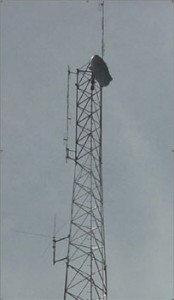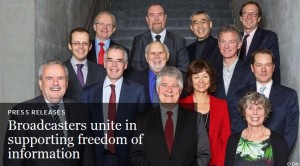Many thanks to SWLing Post contributor, Gary Wise (W4EEY), who writes:
I stumbled over an interesting documentary on radio jamming. You have probably seen it, but just in case you haven’t, here is a link.
I had not seen this before, Gary. Thank you!

Many thanks to SWLing Post contributor, Gary Wise (W4EEY), who writes:
I stumbled over an interesting documentary on radio jamming. You have probably seen it, but just in case you haven’t, here is a link.
I had not seen this before, Gary. Thank you!
Have you noticed less Firedrake broadcasts lately? I certainly have. My buddy David pointed this out to me last week and since then I haven’t heard Firedrake even once. I have, however, heard the more aggressive and noisy Chinese jamming techniques.
Perhaps it’s just a “watched pot never boils” situation? I’m not sure; some SWLs on the hard-core DX reflector have also noticed a lack of Firedrake across the bands.
Have you heard Firedrake lately? Please comment with loggings.
For readers who are unfamiliar with Firedrake, check out this previous post.
 (Source: Australia News Network)
(Source: Australia News Network)
An international broadcast association has condemned the deliberate jamming of shortwave broadcasts, including those from the ABC’s Radio Australia service, into Asia.
The Association for International Broadcasting (AIB) says English-language broadcasts from Radio Australia, the BBC World Service and the Voice of America are being jammed.
Chief Executive Simon Spanswick has told Radio Australia’s Connect Asia program research has indicated the jamming signals appear to be coming from within China.
“It appears to be quite wide,” he said.
“We’ve been talking to some monitors who keep ears on the shortwave bands around Asia and they say that it’s certainly audible well outside China.
“So, one imagines, even with the geographic scale of China itself, that this is right across the region.” […]
“What the Chinese have done for a long time is actually broadcast Chinese folk music [see our previous posts on Firedrake]…what’s happening in this case is that they’re transmitting a different sort of noise.
“The aim is to simply make it so uncomfortable to listen to that people switch off and don’t bother trying to listen to the program that they wanted to get.”
The AIB has lodged protests over the jamming with the Chinese embassies in Washington, London and Canberra.
 (Source: VOA)
(Source: VOA)
The Voice of America is protesting new jamming of its English broadcasts in China.
VOA Director David Ensor condemned the new interference and said the U.S. government broadcaster is working with experts to determine the precise origin of the jamming. He said “the free flow of information is a universal right and VOA will continue to provide accurate and balanced information on platforms that can reach audiences in areas subject to censorship.”
The U.S.-funded VOA is not the only victim of jamming. The British Broadcasting Corporation said this week its shortwave English radio broadcasts also are being jammed in China.
The BBC said that while it is not possible to know who is doing the jamming, “the extensive and co-ordinated efforts are indicative of a well-resourced country such as China.”
VOA broadcast engineers say Radio Australia also is being jammed.
At VOA headquarters in Washington, engineers say that while the agency’s Chinese-language broadcasts are routinely jammed in China, its English broadcasts usually are not. They noticed the jamming of the English programs about a month ago and say it appears to use a new technology.
Many countries have used various methods to jam VOA broadcasts for decades, especially during the Cold War when VOA broadcast heavily into the former Soviet Union and other countries under Communist control. Now, its Persian satellite television broadcasts into Iran are frequently jammed, as are VOA Horn of Africa broadcasts to Ethiopia.
Note our previous article on the topic of harmful interference from China.
 The international broadcasting arms of France, Australia, the US, the United Kingdom, Germany, Japan and the Netherlands issued a joint statement in support of press freedoms across the globe. With the exception of the Netherlands (RNW), all of these countries still broadcast over the shortwaves.
The international broadcasting arms of France, Australia, the US, the United Kingdom, Germany, Japan and the Netherlands issued a joint statement in support of press freedoms across the globe. With the exception of the Netherlands (RNW), all of these countries still broadcast over the shortwaves.
(Source: BBC Media Center via Kim Elliott)
We, the representatives of Audiovisuel Extérieur de la France (AEF), Australian Broadcasting Corporation (ABC) [Australia], British Broadcasting Corporation (BBC) [United Kingdom], Broadcasting Board of Governors (BBG) [US], Deutsche Welle (DW) [Germany], Nippon Hoso Kyokai (NHK) [Japan] and Radio Netherlands Worldwide (RNW), have met in Berlin to discuss common concerns.
We find international journalism is facing unprecedented challenges from countries that seek to deny their own citizens access to information from outside their borders in violation of Article 19 of the Universal Declaration of Human Rights, which states:
“Everyone has the right to freedom of opinion and expression; this right includes freedom to hold opinions without interference and to seek, receive and impart information and ideas through any media and regardless of frontiers.”
We call upon the world’s nations to strengthen their commitment to Article 19 and to support expanded opportunities to share information across borders through digital and mobile technologies.
Yet we note with dismay that certain governments continue to control the flow of information. For example, China routinely blocks the Web and social media sites of our broadcasters and jams our shortwave signals, or Iran and Syria interfere with the satellite signals that carry our programs. Governments in Eurasia, Africa, the Middle East and Latin America also seek to control what their own citizens can see, hear and read.
Many of these actions, including intentional jamming of satellites, violate international regulations. We condemn them without reservation.
We also call attention to troubling new challenges to free expression. Some governments are seeking to enact far-reaching telecommunications regulations to stymie free speech.
At the World Conference on International Telecommunication (WICT) in Dubai, representatives of the world’s nations have considered telecommunications rules that might explicitly apply to the Internet for the first time.
We cast a wary eye on such efforts to control the Internet, and we denounce efforts to identify and track Internet users in order to stifle free expression, inquiry and political activity.
We have agreed to increase, whenever possible, our support for efforts to circumvent Web censorship through the use of new and innovative hardware and software tools. We also agreed to increase our advocacy for Internet freedom.